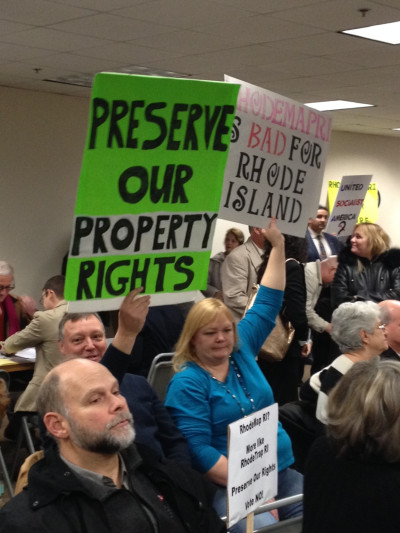Speaker Mattiello Has Sights on Ending HealthSource RI
Friday, February 13, 2015
HealthSource RI is slated to cost the state nearly $15 million next year as part of a projected $23.6 million budget -- and Speaker of the House Nicholas Mattiello has indicated that if that number isn't reduced, he won't rule out "turning it over to the Feds."
"I know that they're working on trimming that number down significantly," said Mattiello, as the state awaits Governor Gina Raimondo's budget proposal on March 12 for Fiscal Year 2016. "In my mind, the question is can they trim it down enough that it is efficient for our citizens."
"The General Assembly will ultimately have to make the decision as to if and how we fund it, through budget appropriations or through some type of fee," continued Mattiello of the projected $14.4 million cost to the state in the coming year to run the exchange. "That's our jurisdiction. If it's not efficient, we'll certainly look to turn it over to the Feds."
GET THE LATEST BREAKING NEWS HERE -- SIGN UP FOR GOLOCAL FREE DAILY EBLASTBoth Mattiello and Senate President Teresa Paiva Weed spoke to the state's healthcare exchange at the Greater Providence Chamber of Commerce legislative luncheon this week, with Paiva Weed saying she supported keeping HealthSource RI -- but not without addressing the costs.
"It's not the model car we're diving, it's a weight problem," said Paiva Weed. "There's been a tremendous amount of money spent on marketing, and [spent] investing in the call centers. Those are just two areas where the exchange [costs] can be trimmed down. I believe it can be trimmed down without abandoning its core mission."
Looking at Costs
Mattiello spoke Thursday to the jurisdiction that the House and General Assembly have over HealthSource RI -- and if the funding is not appropriated, how then by default the exchange would go to the Federal government.
Currently, Rhode Island is one of thirteen states (plus Washington, DC) to operate its own exchange; the rest comply with the Affordable Care Act through the federally-operated exchange.
"We need $14.4 million that has to go into the budget for next year from what we hear," said Mattiello. "If we're not willing to appropriate that, and say [HealthSource] is able to get federal grants to cover that, we can still within the parameter of the budget process opt to have it turned over to the feds, due to its fiscal implications."
Mattiello noted he has been talking with Governor Raimondo and his colleagues in the General Assembly as to what a feasible cost structure might be.
"I've been collaborating with the Governor, and the Senate President and my members and we will come up with a consensus," said Mattiello. "The argument that I hear the most for keeping HealthSource RI that it's something that Rhode Island has done well and we should have pride in that-- but I've also learned of significant problems within the exchange. There's a certain pride operating it at the state level, but it can't come at the expense of inefficiencies. "
HealthSource RI's new Executive Director Anya Rader Wallack said that she was working with Raimondo to reduce operating costs -- and budget estimates.
“I’m working closely with the Governor to significantly reduce the previous budget estimate for operating HealthSource RI and to make the case for keeping a state-based exchange," said Wallack. "Handing it over to the Feds means ceding local authority and control, as well as potential benefits to the state-- including jobs and ways in which we can serve small businesses. There is also uncertainty about whether Rhode Islanders would continue to receive tax credits they currently receive through HealthSource RI (estimated at $67M in calendar year 2014).”
As of January 31, 2015, HealthSource RI reported that 78% of its first year customers had renewed for 2015, totaling 19,887 -- and that over 7,500 new customers signed up for 2015.
Supreme Court Ramifications?
In the coming weeks, the U.S. Supreme Court is scheduled to take up King v. Burell, which will challenge subsidies under the Affordable Care Act -- and could have ramifications in Rhode Island.
Freshman State Representative and attorney Blake Filippi provided his vantage point.
"If the Supreme Court says subsidies are available anywhere -- to states with their own exchange, or not -- if we get rid of HealthSource RI, there's not much downside," said Filippi. "However, if the Supreme Court says those subsidies are only available where a state run exchange has been established, it becomes an interesting political issue."
Filippi continued, "If we keep HealthSource RI, the continued federal subsidies will help many economically disadvantaged people purchase health insurance. However, it comes at a cost. The subsidies will impose the individual mandate on many poor persons that would not be able to afford health insurance without these subsidies, and critically, the continued subsidies will impose the large employer mandate on many of our businesses."
"The law currently says that the large employer mandate is applicable where subsidies are available," said Filippi. "So, if we keep HealthSource RI and the federal subsidies that come along with it, our large employers are subject to this mandate. If we get get rid of HSRI, we don't have federal subsidies -- or the large employer mandate tax."
Filippi summed up the implications, as they pertained to the current debate.
"This is a critical issue," said Filippi. "We have to decide whether the continued subsidies are worth having the large employer mandate tax imposed on our businesses. As we try to attract new businesses to come here, if we're one of a minority of states with its own exchange that imposes the large employer mandate, we have to consider the impact on the cost of doing business here versus the 34 states without this significant expense."
Mattiello acknowledged the potential impact on states depending on the Supreme Court outcome -- but asserted that the state would move forward as the law currently stands.
"There would be one argument for keeping [in the state] to keep the subsidies for our citizens, but the other argument is then you don't have the mandate. You can make the argument from either side, depending," said Mattiello.
"Right now the law is constitutional, and the law is you get the subsidies in either system," continued Mattiello. "That being the case, we've made the decision that our collective belief is that the most appropriate way to move forward is under the assumption that the subsidies will be provided in either system, and act accordingly on that belief."
Across the State
Groups in Rhode Island are divided over the success and efficacy of HealthSource RI in the state -- and weighed in on the prospect of it going to the Feds.
“It’s hard to see the enrollment numbers as anything other than disappointing,” said Mike Stenhouse, president and CEO of the Rhode Island Center for Freedom and Prosperity. “The fact they are so far behind their original enrollment estimates of 100,000 suggests most Rhode Islanders don’t want what they’re selling, and therefore local funding of HealthSource RI does not present an acceptable cost-benefit return.”
"Our Center recently published a report that recommended patient-centric, free-market reforms as the best means to lower costs and increase access to healthcare services," continued Stenhouse. "We think it would be precisely the wrong approach if the new administration were to move towards a government-centric, centrally-planned one-size-fits-all approach. We'll find out soon enough."
Advocacy group RI Taxpayers' Monique Chartier provided the following statement on behalf of the organization.
"It's important to note, first of all, the failure of ObamaCare and HealthSource RI to fulfill one of their most important goals: to offer a broader range of reasonably prices policies and to lower the cost of health insurance coverage," said Chartier. "This has not happened. In fact, many customers have found that they must accept policies that are actually more expensive, either premium-wise or in terms of higher deductibles. So HealthSource RI offers little to no value in terms of saving on health insurance coverage."
Supporters of keeping the exchange in the state are making their case to make sure that it stays run by Rhode Island.
"Rhode Island should keep HealthSource RI which is putting the state on a path to a future that is both healthier and more economically secure. HealthSource provides one-stop shopping for quality, affordable health insurance for Rhode Islanders. Individuals and families can compare a number of health insurance plans in one place and pick the plan that works best for their health care needs and budgets. Consumers have already seen an increase in the number of options and a decrease in the cost of some plans," said Linda Katz with the Economic Progress Institute. "They have easy access to the affordability options that help them pay for insurance. "
"HealthSource RI has worked to address the needs of small employers and employees through innovation in the SHOP – the marketplace for small businesses," continued Katz. "Dismantling HealthSource RI and participating in the federal marketplace means losing control over a key part of our health care system. Changing to the federal exchange is not without cost: Rhode islanders will still need to pay a fee to use the federal exchange; depending on the outcome of the Supreme Court case, Rhode Islanders could lost the federal tax credits that help them pay for insurance; insurers will need to revamp systems to interface with the federal exchange."
Related Slideshow: Ten Bills to Watch in 2015 General Assembly
The last day for bill introductions in the Rhode Island House of Representatives is slated for February 12, but things should really begin heating up one month following, when Governor Gina Raimondo is due to present her FY16 budget proposal to the chamber -- and members have a new sense of the fiscal realities facing the state, and what the Governor will be pushing for.
With the 2015 General Assembly just underway (and over four months to go), below is a list of 10 of the top bills facing the General Assembly now, or expected to come.
Related Articles
- NEW: HealthSource RI Reports 4,642 Processed Applications to Date
- Smart Benefits: Will HealthSource RI Meet Enrollment Expectations?
- NEW: Healthsource RI Announces Health Benefits Exchange Rates
- NEW: HealthSource RI Issues Enrollment Deadline Updates
- New Competition for HealthSource RI Emerges
- Smart Benefits: HealthSource RI Gets More Federal Funding
- Raimondo’s Choice for HealthSource RI Failed in Vermont
- NEW: Raimondo Replaces Ferguson at HealthSource RI
- The Scoop: Giroux to Run for Gov, RI Tea Party Talks Obamacare
- Will Obamacare Help - or Hurt - Rhode Island Businesses?
- Smart Benefits: 3 Ways Obamacare Hurts Employees
- Lisa Blais: RI’s Obamacare Landscape: Got Coverage?
- Carol Costa: Click Here… Oops: Obamacare’s Legit Problem
- Rob Horowitz: Campaign To Strangle Obamacare In Its Crib Will Fail
- Lisa Blais: Big Labor Wants To Shuffle The Deck On Obamacare
- Smart Benefits: Obamacare Mandates: What Is And Isn’t Delayed
- Smart Benefits: Employers Who Ignore Obamacare Will Pay
- Securitas Blames Obamacare for Dropping Rhode Island Healthcare
- Smart Benefits: A Bad Week Brings Reactionary Changes to Obamacare
- Smart Benefits: Obamacare Extends Sign-Up for Exchanges… Again
- Horowitz: Obamacare - Here to Stay and on the Right Track
- Obamacare Implications of Medical Marijuana in Rhode Island
- Smart Benefits: Obamacare Exchanges: Enrollment Expectations
- Arthur Schaper: ObamaCare-Less in RI
- Arthur Schaper: Reid and Reed’s ObamaCare Screeds
- Rob Horowitz: Obamacare—Hold the Shovels
- Smart Benefits: Polls Show Most Americans Skeptical of Obamacare
- Smart Benefits: Obamacare Brings Big Changes to Small Employers
- NEW: Fung Responds to Obamacare Diagnosis as “Job Killer”
- Smart Benefits: Obamacare vs RI Exchange- Which Enrollment Approach Worked Best?
- Obamacare Could Leave 1 in 10 Rhode Islanders Uninsured


























